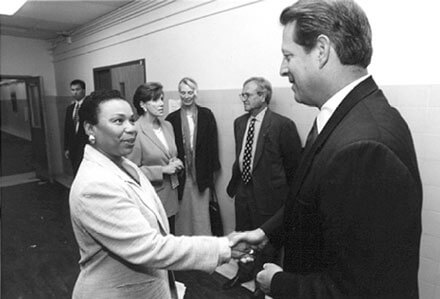The president increases last year’s expenditure, but AIDS advocates demand more
George W. Bush submitted a $2.4 trillion budget on February 2 that would increase spending for the military and national security in the new fiscal year, but cut back on discretionary programs.
The administration’s budget includes a $400 million increase in global spending to fight AIDS, tuberculosis and malaria. Those three diseases account for the largest group of preventable diseases in developing nations.
The Bush spending request sets the stage for battles with a wide array of groups—including evangelical churches and gay rights groups—before money is actually appropriated for AIDS programs some time this summer.
According to Debt, AIDS, Trade, Africa (DATA) a non-profit group that lobbies governments on behalf of the developing world, 6,500 Africans die from AIDS and another 9,500 contract HIV daily. The group estimates that 4.1 million African AIDS patients are in need of anti-retroviral drugs, but only 50,000 are receiving such medication. Furthermore, the organization states that of the $10.5 billion needed annually to fight AIDS, only half that amount is being spent.
With a projected deficit this year of $521 billion, the largest in U.S. history, budget increases in non-entitlement spending, meaning most programs aside from the military and Social Security, will come under fierce scrutiny as various Congressional committees and outside budget watchdog groups pore over a budget that calls for the elimination of over 65 programs.
The president’s $2.8 billion request to fight AIDS worldwide indicates a willingness to fulfill a commitment made last year to spend $15 billion over five years to treat AIDS victims and stop the spread of the HIV virus. The president touted the multi-year initiative during a visit to African nations last July.
However, this week, various critics assailed the administration for failing to meet a minimum commitment of $3 billion annually.
Dr. Paul Zeitz, executive director of the Global AIDS Alliance, said that “Bush is committing the bare bones minimum” to the fight against AIDS. A doctor of osteopathic medicine, Zeitz spent six years in Zambia during the 1990s when HIV began to hit and people died in large numbers from what they referred to as the “skinny disease.”
Zeitz derided the 2005 AIDS budget request as a “half-baked, half-crocked response to what even administration officials refer to as a major threat.” He said that attempts by the administration to “back load” the $15 billion commitment in the latter years of the five-year term was a strategy that bargained the lives of Africans for the sake of American political expediency.
Zeitz called for a $5.4 billion annual commitment, a sum proportional to the overall wealth produced by the U.S., as called for in a formula propounded by the Global AIDS Roundtable.
In his 2003 State of the Union address, the president spoke of the need to mount a serious attack against AIDS, generating expectations that the administration’s 2004 budget would greatly increase the global AIDS expenditure.
AIDS advocates and health care experts, including many church-based medical providers in the developing world, expecting a $3 billion appropriation, were outraged when the president submitted a budget requesting $2 billion.
Eventually, during intense budget negotiations over the summer, the amount was raised to $2.4 billion, in part due to the efforts of a bipartisan coalition of members of Congress.
Rep. Jim Kolbe, an Arizona Republican, who is gay, chairs the foreign operations subcommittee on the Appropriations Committee.
A spokeswoman for Kolbe, Neena Morjani, said the congressman would not comment on whether he will seek this year to increase funding for the global AIDS effort, but released a written statement in which Kolbe applauded the president for seeking an increase in national security spending. Kolbe also said that he was “pleased that the President is meeting his commitment to combating the international HIV-AIDS pandemic and to launching the Millenium Challenge Account – a new paradigm in distributing foreign aid.”
Kolbe was referring to an initiative introduced by Bush in 2002 in which developing nations, which adhere to strict guidelines, could apply for grants from an aid account provided by the industrialized world. At the time Bush announced the program, he said such money would “reward nations that root out corruption, respect human rights, and adhere to the rule of law.”
Seth Amgott, a spokesman for DATA, said that his group supports the Millenium Challenge as well as an increase in funding to the Global AIDS Fund, a multi-national organization of which the U. S. Secretary of Health and Human Services Tommy Thompson serves as chairman of the board. The multi-lateral fund was established in 2001 by the United Nations to combine the efforts of private corporations and industrialized nations in the AIDS fight.
Various members of Congress have championed the fund in its efforts to raise what experts estimate to be a requisite $10 billion needed annually to stem the increase in the worldwide HIV infection rate, treat AIDS sufferers and address the ancillary damage caused by the disease, such as the growing number of orphaned children in Africa.
Rep. Barbara Lee, a California Democrat who serves on the International Relations Committee, issued a written statement in which she said that the $200 million included in the president’s $2.8 billion AIDS request is a 63 percent reduction from last year’s funding for the Global AIDS Fund. “As an innovative multi-lateral institution that can leverage greater funding from other donors, the Global Fund deserves more than just our token support,” said Lee, adding, “Fighting AIDS should never mean that we have to rob Peter to pay Paul.”
Another House Democrat, Nita Lowey of New York, sits on the same Appropriations subcommittee as Kolbe. In a written statement, Lowey criticized Bush’s 2005 request for $2.5 billion for the Millenium Challenge, which she characterized as a “new and untested” initiative. “On HIV/AIDS the President has come closer to the $3 billion authorization than he did last year, but $2.8 billion still falls short. I hope Congress won’t be left, as we were last year, scrounging and stealing from other priorities in order to fully fund the initiative.”
The primary U.S. agency responsible for delivering AIDS money abroad is USAID. In many cases, money is granted to non-governmental organizations, including church-based groups, that have health service facilities in place in hard-hit nations like Haiti.
The National Association of Evangelicals is a religious group that lobbies in Washington on behalf of 45,000 U.S. churches, many of whom send workers and missionaries abroad to care for AIDS victims.
“Between authorizations and appropriations—there lies the shadow,” said Rev. Richard Cizik, the group’s vice president for governmental affairs. “In order to get $15 billion spent over five years, you need to spend $3 billion annually. I understand the argument about back loading the money until nations have ‘capacity,’ but I respectfully disagree,” said Cizik. “You spend the money to build capacity in the instances where there is incapacity.” Cizik stated that “faith-based organizations provide fifty percent of the health care in Africa to AIDS victims.” When asked if any of last year’s $2.4 billion appropriation funded the programs Cizik’s group advocates for, he responded, “ A pittance. I don’t know where the money went. I have been told that big entities get the big dollars.”
While groups like DATA support efforts to force developing nations to root out corruption and streamline provision of health services to AIDS sufferers, there is wide disagreement over whether the U.S., or a multi-lateral organization like the Global Fund, gets to decide how nations spend that money.
Jamie Drummond, the executive director of DATA, issued a statement in which he said the president’s budget “aggressively supports the exciting new initiatives on AIDS and poverty,” like the Millennium Challenge. But Drummond also criticized Bush for reducing funding to the Global Fund by more than half, or “to the level of France’s commitment.”
Sharonann Lynch of Health GAP, a New York-based group that monitors worldwide AIDS spending, said that the Global Fund is the best organization to get low-cost anti-retroviral drugs to AIDS victims. Lynch criticized Bush for “cherry picking the nations to support,” a strategy she characterized as indicative of the administration’s unilateral foreign policy that is punitive to nation’s that speak against the United States. Lynch also criticized the policy of earmarking AIDS money for abstinence-only safe sex education that downplays the use of condoms in curbing the spread of HIV. “We are exporting abroad what we know doesn’t work at home,” Lynch said.
For his part, Cizik, of the evangelicals’ association, focused on how best to get aid to people quickly. He indicated that his group would “use their good name to get Republicans to increase the amount for AIDS spending.” He was sanguine about those negotiations. “It’s probably the case,” Cizik added, “that AIDS victims in Africa are going to take a hit. They have no Washington lobby.”


































